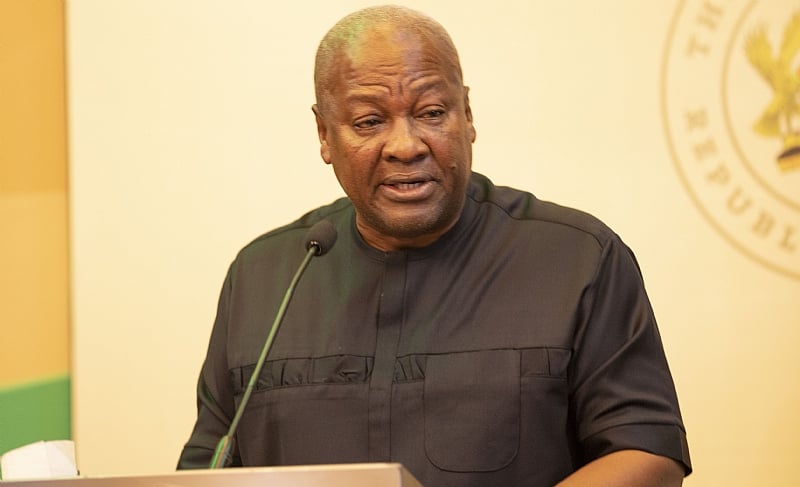President John Dramani Mahama’s first media encounter since assuming office underscored his administration’s commitment to fiscal prudence and a cautious approach to external borrowing. He emphatically ruled out a hasty return to the international capital market, emphasizing Ghana’s capacity to finance its development through disciplined spending and efficient allocation of resources. The President pointed to the recent economic resurgence, achieved without reliance on external loans, as compelling evidence of the nation’s ability to fund growth sustainably. This commitment to self-reliance signals a significant departure from past practices and reflects a determination to break the cycle of dependence on external financing, which often comes with stringent conditions and potentially adverse consequences. This new direction prioritizes internal resource mobilization and prudent financial management as the cornerstones of Ghana’s economic recovery and long-term growth strategy.
The President’s assertion that Ghana “shouldn’t be in a hurry to go back to the capital market” is rooted in the nation’s recent experience. In 2022, ballooning debt, sluggish economic growth, and a precarious balance of payments position compelled the government to seek a $3 billion bailout from the International Monetary Fund (IMF). This bailout, a necessary intervention to stabilize the economy, came with the obligation to implement a series of reforms aimed at restoring macroeconomic stability and promoting sustainable growth. Since then, Ghana has diligently adhered to the IMF program, making demonstrable progress despite the challenges posed by the December 2024 elections. The current administration’s commitment to fiscal discipline aims to consolidate these gains and prevent a recurrence of the circumstances that necessitated the IMF bailout, demonstrating a resolve to build a more resilient and self-sufficient economy.
The recent economic indicators paint a picture of recovery and renewed optimism. The economy expanded by a robust 6.3 percent in the second quarter of 2025, fueled primarily by a substantial 9.9 percent growth in the services sector. Inflation, a key indicator of economic health, has seen a consistent decline, reaching 11.5 percent in August, the lowest rate in nearly four years. This sustained deceleration in inflation signals the effectiveness of the government’s economic policies and reinforces the positive trajectory of the recovery. The President attributed these positive developments to the implementation of a “prudent and people-centred economic management plan,” which has encompassed the removal of burdensome taxes, the stabilization of the exchange rate, and efforts to reduce the cost of doing business, thereby creating a more conducive environment for economic activity.
President Mahama emphasized the pivotal role of fiscal discipline and prioritized investment in driving the country’s economic resurgence. He underscored the importance of directing resources towards strategic areas, eschewing wasteful political interventions, and focusing on initiatives with tangible developmental impact. This disciplined approach to public spending has resulted in a marked improvement in the nation’s fiscal performance. The country has transitioned from a negative primary balance of 3.4 percent to a positive 1.1 percent, exceeding expectations and demonstrating a commitment to fiscal responsibility. The President expressed confidence that Ghana would surpass its 1.5 percent target by the end of 2025, further solidifying the country’s fiscal position and bolstering investor confidence.
The President’s emphasis on prioritizing strategic investments and streamlining expenditure underscores a commitment to utilizing resources effectively to maximize their impact. This approach aims to ensure that public funds are channeled towards initiatives that contribute to sustainable development, stimulate economic growth, and improve the well-being of the Ghanaian people. By avoiding wasteful spending and focusing on productive investments, the government aims to create a virtuous cycle of economic growth and development, leading to improved living standards and greater prosperity for all Ghanaians.
President Mahama’s vision for Ghana’s future centers on consolidating the current macroeconomic gains before contemplating a return to external borrowing. He articulated his administration’s mission as one of “resetting Ghana, restoring the soul of our nation, reviving its economy, and reigniting the spirit of hope and possibility in every Ghanaian.” This statement encapsulates the President’s commitment to building a robust and resilient economy that benefits all citizens, fostering a sense of national pride and shared prosperity. This focus on internal strength and self-reliance signifies a new era in Ghana’s economic development, one that prioritizes sustainable growth and long-term prosperity over short-term gains achieved through external dependence.














